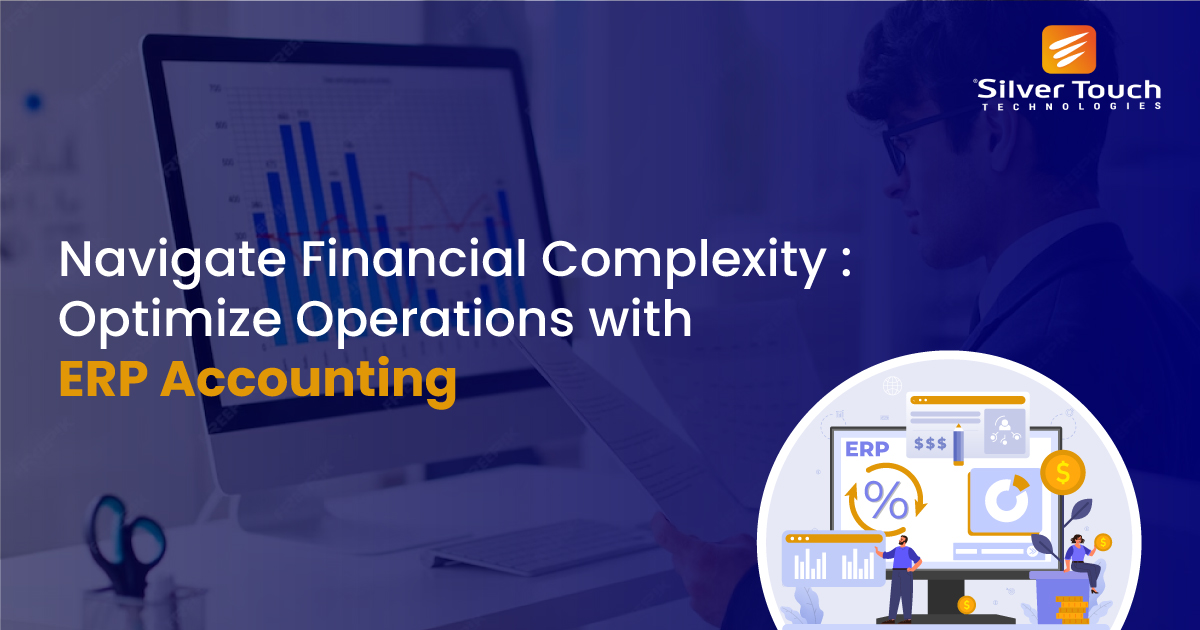There is no denying that the accounting department is probably one of the most vital departments in an organisation. From small enterprises to big MNCs, every business needs to keep a close tab on its finances. So, in a data-driven world, naturally, companies look for an intelligent solution that can help track finances and transactions and improve the overall financial health of the company. A survey conducted with 255 companies revealed that 89% of participants said accounting is the most vital ERP function. So, what is an ERP system in accounting?
Understanding ERP Accounting Systems
ERP or enterprise resource planning systems are new-age tools that help companies optimise the workflow and streamline processes across various departments like finance, marketing, sales, production, HR, etc. Accounting ERP systems are specialised software that cater to the accounting department and related activities. An accounting system allows the company to store all crucial financial data under a unified platform and access it in real time. Additionally, it rids the company of siloed accounting information. Hence, it gives timely data access to concerned individuals for accurate decision-making.
How can an Accounting ERP System Benefit your Business?
Accounting ERP systems are dynamic enterprise-level tools that enhance financial management by:
Streamlining Operations
ERP accounting systems reduce manual tasks, repetition, and likelihood of errors. It also standardises procedures that streamline operations at all levels. Such solutions also save employees time and effort.
Improving Data Accuracy
ERP systems for accounting and finance act as a single source of truth. It minimises error and duplicity in data. Moreover, it eliminates siloed data. Hence, it enhances the data quality required for decision-making and financial reporting. Inaccurate data can cause financial data misrepresentation and land the company in legal trouble.
Enhancing Productivity
Since these solutions help streamline and automate tasks, the finance department can focus on vital and strategic activities that boost company growth. Better data security: An ERP accounting system comes with high-level data security and data access measures that safeguard vulnerable financial data. It protects the company from data breaches.
Want to Stay Ahead in the Competitive Market? Embrace ERP Implementation for Accounting System

How to Choose the Right Accounting ERP Systems?
Selecting the right ERP accounting system can be arduous, especially for a small business with bootstrapped budgets. To simplify, companies need to look at some components of the system that support their immediate as well as long-term goals. These are common to all businesses aiming to grow in the future.
Flexibility
One of the key factors to note while choosing an ERP accounting system is ensuring that it is flexible. The system should allow customisation so it can cater to the specific business needs. Additionally, the pricing should also be flexible so it can fit all budgets. For instance, some software systems have different pricing schemes, allowing users to choose one that suits them best.
Scalability
As the business grows, the perfect accounting ERP system should also be able to grow. Similarly, when the business decides to shrink, the system should scale down to fit the business needs. Scalability is an important capability in the present business landscape. With smart accounting ERP solutions, businesses can scale up or down without restrictions or additional investment.
Integration Ability
The chosen ERP system accounting software should be able to integrate with other solutions like sales, production, HR, payroll and CRM. Integration allows departments to work in tandem, eliminate data silos and ensure the free flow of data. It also reduces task and data duplication, therefore optimising work processes.
User-friendliness
Is the ERP accounting system easy to use, and can teammates with limited to no technical expertise use it? The effectiveness of a system depends on how well the employees can use it. In case the accounting software is extremely complicated, it can be difficult for the employees to use it optimally. It can lead to the need for rigorous training and high training costs. Hence, the accounting ERP system should be user-friendly and require minimum training.
Vendor Reputation
It is also important to choose a reputable vendor with a successful track record of handling ERP systems for accounting and finance. Prompt support, maintenance, and comprehensive services can improve the user experience of the accounting system.
ERP vs Accounting Software: What is the Right Solution for Your Business?
For a long time, companies have relied on standalone accounting systems for financial management. However, as businesses grow and their operations become more complex, these systems often become inefficient and redundant. System insufficiency can lead to task as well as data duplication. Moreover, standalone accounting software cannot pool or integrate data from other systems.
Going along, the reports generated by such systems are inadequate and superficial. Hence, it can be difficult for the decision-makers to get a complete overview of the company’s finances and underlying factors influencing them and foresee the company’s future. The lack of insights can lead to impaired judgment and financial losses. Finally, standalone accounting systems have limited to zero options for customisation, forcing all businesses to use the same functions despite different needs, nature and operations.
When companies switch to ERP accounting systems, they open gates to new possibilities and a 360-degree overview of company finances. Since ERP systems act as a central database, anyone with proper access permissions can use the data. The accounts department can also gather data from other departments to get a holistic view. Moreover, these systems generate detailed reports to improve financial data tracking and enable better decision-making. They also help forecast sales, demands, and slowdowns and help the company prepare for different situations.
ERP systems for accounting and finance are packed with robust technologies and multiple capabilities. Nevertheless, they can be customised to fit the unique business needs. For instance, a retail business will have different financial management needs than a home cleaning service company. An accounting ERP solution can cater to both companies through customisations and plug-ins. Therefore, if you are still using a standalone accounting system, it is time to upgrade to an ERP accounting system.
4 Key Differences Between ERP and Accounting Software
To help companies make an informed choice, here is a detailed comparison between ERP and accounting systems:
| Point of Difference | ERP Accounting Systems | Standalone Accounting Systems |
| Functionality | An ERP accounting system caters to the accounting department but also has other built-in modules like HR, sales, CRM, etc. Hence the scope functionality is broader in this case. | Standalone systems only deal with the accounting and financial needs of the company. So it has a limited scope of functionality. |
| Integration | These systems allow the company to integrate other software to ensure smooth data flow and create a unified financial database. | Due to the lack of integration, data from other sources are unavailable on this platform leading to scattered, duplicate or missing data. |
| Complexity | Since, an accounting ERP system has a broader scope, multiple modules and integration capabilities, it is a complex tool and requires more resources. | These have upfront costs and a low level of complexity. Standalone systems are straightforward and easy to deploy and use. However, in the long run, they lack scalability and flexibility. |
| Inventory tracking | Accounting ERP systems allow manufacturers and retailers to track inventory and predict demand and supply. Such in-depth insights and forecasting help the accounting department account for upcoming expenditures, transactions, profits and losses. | Standalone accounting systems cannot gather inventory-related data. Hence, it is unable to provide any insight to the decision-makers. |
Take your Business to the Next Level with Customized ERP Solutions
Silver Touch Technologies: The Perfect Partner for your Accounting ERP Systems
To ensure that your company finances are in safe hands, you need to choose a trustworthy accountant or a finance manager. Similarly, choosing the right accounting ERP system partner is also crucial for your company’s well-being. Silver Touch Technologies is one of the premium SAP partners that offer end-to-end SAP accounting software services. Right from planning to implementation and support, our SAP experts do it all. Enjoy professionally managed ERP solutions and 99% uptime with Silver Touch’s SAP Business One Cloud services. Contact us today or book a demo to take control of your company finances.
FAQs on ERP Accounting Systems:
An accounting ERP system is a specialised ERP tool that streamlines activities for the accounting department, acts as a centralised database, gives real-time access to financial data, helps track finances and boosts the company’s financial well-being.
SAP is a well-known ERP tool that is used in various industries because of its versatility and endless capabilities. SAP ERP accounting system is a specific brand of the SAP software suite that offers agility and automation to accountants and finance professionals for robust financial management.


